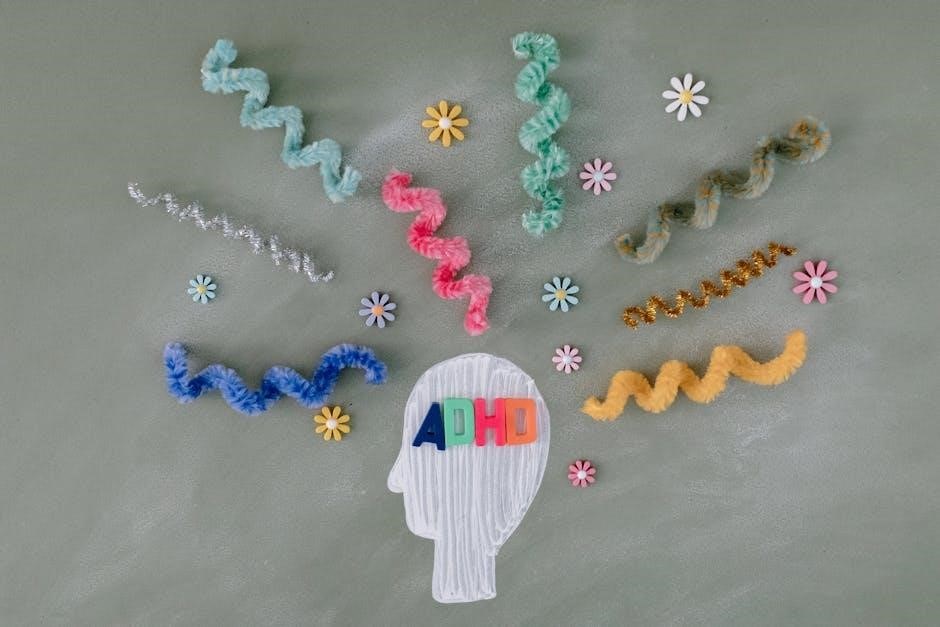Developmental psychology examines the systematic changes in human behavior, cognition, and emotions across the lifespan. It explores growth, development, and adaptation from infancy to old age, providing insights into how individuals evolve physically, mentally, and socially.
1.1 Overview of Developmental Psychology
Developmental psychology is the scientific study of systematic psychological changes, emotional development, and perception changes that occur throughout a person’s lifespan. It examines how individuals grow, adapt, and evolve from infancy to old age, focusing on cognitive, emotional, social, and physical development. This field explores the processes that shape human behavior, including learning, language acquisition, moral development, and interpersonal relationships.
Developmental psychologists investigate key questions, such as the nature of growth, the role of genetics and environment, and the impact of culture on development. They also study how individuals navigate life transitions, such as puberty, parenthood, and aging. By understanding these processes, developmental psychology provides insights into promoting healthy development, addressing developmental challenges, and enhancing well-being across the lifespan.
The field is interdisciplinary, drawing on theories from psychology, sociology, biology, and education. It emphasizes the importance of context, recognizing that development occurs within specific social, cultural, and historical environments. Developmental psychology offers a comprehensive framework for understanding human growth and development, making it a vital area of study for researchers, educators, and practitioners alike.
1.2 Importance of Studying Developmental Psychology
Studying developmental psychology is crucial for understanding human growth and development across the lifespan. It provides insights into cognitive, emotional, and social changes, enabling the creation of effective educational and mental health interventions. By exploring how individuals develop within different contexts, professionals can design policies and programs that support healthy development. Developmental psychology also helps parents and caregivers nurture children effectively and informs public health initiatives. Its interdisciplinary nature integrates biology, sociology, and education, offering a holistic view of human development. Understanding cultural influences and developmental stages is vital for promoting diversity and well-being. Ultimately, developmental psychology enhances our ability to improve education, mental health, and societal support systems, contributing to a better quality of life for individuals across all ages.

Theoretical Foundations of Developmental Psychology
Developmental psychology’s theoretical foundations include Freud’s psychosexual stages, Piaget’s cognitive development, Erikson’s psychosocial theory, and Bandura’s social learning. These frameworks explain human growth, emotional, cognitive, and social development across the lifespan.
2.1 Freud’s Psychosexual Development Theory
Sigmund Freud’s Psychosexual Development Theory proposes that personality development occurs through a series of five stages, each characterized by a specific focus of pleasure and potential psychological conflict. The stages are: Oral (infancy, focus on mouth), Anal (toddlerhood, focus on control), Phallic (early childhood, focus on genitals), Latency (childhood, suppression of sexual desires), and Genital (adolescence and adulthood, integration of sexuality into relationships). Freud argued that unresolved conflicts at any stage could lead to fixation, where desires remain centered on earlier stages, influencing adult behavior and personality traits. This theory emphasizes the role of unconscious desires and conflicts in shaping development. While influential, Freud’s theory has faced criticism for its lack of empirical support and its focus on sexual themes. Despite these critiques, it remains a foundational concept in developmental psychology, offering insights into the interplay between biological drives and psychological growth.
2.2 Piaget’s Cognitive Development Theory
Jean Piaget’s Cognitive Development Theory outlines how children construct their understanding of the world through active interaction and experience. According to Piaget, development occurs in four distinct stages: Sensorimotor (0–2 years), Preoperational (2–7 years), Concrete Operational (7–11 years), and Formal Operational (12+ years). Each stage introduces new ways of thinking, with children progressing from sensory-based learning to abstract reasoning. Piaget emphasized the role of schemas (mental frameworks) that individuals use to organize information. As children encounter new experiences, they either assimilate information into existing schemas or accommodate by adjusting their schemas to fit new knowledge. This theory highlights the importance of active learning and the sequential nature of cognitive growth. While Piaget’s work has been influential, critics argue that the stages may overlap or vary across cultures. Nonetheless, his theory remains foundational in understanding how children develop logical thinking and problem-solving abilities, shaping educational practices and developmental psychology research.
2.3 Erikson’s Psychosocial Development Theory
Erik Erikson’s Psychosocial Development Theory proposes that individuals go through eight stages of development, each marked by a unique psychosocial conflict. These stages span from infancy to late adulthood, emphasizing the role of social and cultural influences. The first stage, Trust vs. Mistrust, occurs in infancy, where trust is developed through consistent caregiving. In toddlerhood, the conflict becomes Autonomy vs. Shame and Doubt, as children explore independence. Early childhood introduces Initiative vs. Guilt, where children learn to take responsibility. During middle childhood, the focus shifts to Industry vs. Inferiority, fostering competence through achievement. Adolescence brings Identity vs. Role Confusion, a critical period for self-discovery. Young adulthood centers on Intimacy vs. Isolation, where meaningful relationships are formed. Adulthood involves Generativity vs. Stagnation, focusing on contributing to society. Finally, late adulthood addresses Integrity vs. Despair, reflecting on life’s accomplishments. Erikson’s theory highlights the importance of resolving these conflicts to achieve healthy development, making it a cornerstone of developmental psychology.
2.4 Bandura’s Social Learning Theory
Albert Bandura’s Social Learning Theory posits that individuals acquire new behaviors, attitudes, and knowledge by observing and imitating others. It emphasizes the role of observation, imitation, and modeling in learning, suggesting that people learn by watching others and then replicating their actions. Bandura’s theory extends beyond traditional behaviorist approaches by incorporating cognitive processes, such as attention, memory, and reinforcement, which influence learning. A key concept is the idea of reciprocal determinism, where behavior, personal factors, and environmental factors interact dynamically. Bandura’s famous Bobo doll experiment demonstrated that children learn aggressive behaviors by observing and imitating adults. This theory highlights the importance of social environments and the role of observation in shaping behavior, making it highly influential in understanding human development and behavior change. It has practical applications in education, parenting, and therapy, offering insights into how to encourage positive behaviors and discourage harmful ones through modeling and reinforcement.

Research Methods in Developmental Psychology
Developmental psychology employs various research methods, including longitudinal and cross-sectional studies, to examine human development over time. Mixed-methods approaches integrate qualitative and quantitative data for a comprehensive understanding of developmental processes and changes across the lifespan.
3.1 Longitudinal Studies
Longitudinal studies in developmental psychology involve observing the same group of individuals over an extended period, often years or decades. These studies are crucial for understanding long-term developmental trajectories and identifying patterns of growth and change. By tracking individuals, researchers can capture the dynamic nature of development, revealing how early experiences influence later outcomes. For example, a longitudinal study might examine cognitive development in children, monitoring their problem-solving abilities from infancy through adolescence. This method provides rich, detailed data, enabling psychologists to identify critical periods of development and the factors that shape them. While longitudinal studies offer deep insights, they also present challenges, such as participant attrition and the time-intensive nature of the research. Despite these challenges, longitudinal studies remain a cornerstone of developmental psychology, offering unparalleled understanding of human development across the lifespan.
3.2 Cross-Sectional Studies
Cross-sectional studies in developmental psychology involve collecting data from individuals of different ages at a single point in time. This method provides a snapshot of development across various stages, allowing researchers to identify patterns and differences between age groups. For example, a cross-sectional study might compare problem-solving abilities in children aged 5, 10, and 15 to understand cognitive development. While this approach offers a broader perspective, it does not track the same individuals over time, limiting insights into individual growth trajectories. Cross-sectional studies are often more practical and cost-effective than longitudinal studies, as they require less time and resources. However, they may be influenced by cohort effects, where differences between age groups reflect generational or environmental factors rather than developmental changes. Despite these limitations, cross-sectional studies are valuable for generating hypotheses and understanding developmental trends across populations. They are frequently used in conjunction with longitudinal studies to provide a comprehensive view of human development. This dual approach enhances the validity and depth of developmental research.
3.3 Mixed-Methods Approaches
Mixed-methods approaches in developmental psychology combine qualitative and quantitative research methods to provide a more comprehensive understanding of human development. This integration allows researchers to capture both the depth of personal experiences and the breadth of statistical trends; Qualitative methods, such as interviews and observations, offer insights into individuals’ perceptions and behaviors, while quantitative methods, like surveys and experiments, provide numerical data for analysis. By merging these approaches, investigators can address complex questions that a single methodology might not fully capture. For example, a study on cognitive development might use surveys to collect quantitative data on problem-solving abilities across age groups and interviews to explore how individuals perceive their own learning processes. Mixed-methods research also offers flexibility, as it can be designed to prioritize one method over the other or to integrate findings in a way that enhances overall understanding. However, this approach requires careful planning to ensure compatibility between methods and to manage the increased complexity of data collection and analysis. Despite these challenges, mixed-methods approaches are highly valued for their ability to provide a richer, more nuanced understanding of developmental processes.

Key Issues in Developmental Psychology
Developmental psychology examines critical debates such as nature vs. nurture, qualitative vs. quantitative changes, and cultural influences. These issues shape our understanding of human growth, behavior, and cognitive development across the lifespan.
4.1 Nature vs. Nurture Debate
The nature vs. nurture debate is a central issue in developmental psychology, exploring whether human development is primarily influenced by genetic factors (nature) or environmental factors (nurture). This longstanding controversy seeks to understand the relative contributions of biology and experience to behavior, cognition, and emotional growth.
Proponents of the nature perspective argue that genetic makeup and biological processes determine developmental outcomes, such as intelligence, personality traits, and susceptibility to certain disorders. They emphasize hereditary factors and the role of evolution in shaping human characteristics. On the other hand, the nurture perspective highlights the impact of environmental influences, including family, culture, education, and socioeconomic status, in shaping development. This view suggests that learning and experiences play a crucial role in forming who we are.
Modern psychological research increasingly supports an interactionist view, where both nature and nurture influence development. For example, genetic predispositions may interact with environmental factors to shape behaviors or traits. Understanding this interplay is essential for addressing developmental questions and informing interventions in education, health, and policy-making.
4.2 Qualitative vs. Quantitative Development
In developmental psychology, the distinction between qualitative and quantitative development is crucial for understanding human growth; Qualitative development refers to the types of changes that occur, such as improvements in cognitive processes, emotional regulation, or social skills. These changes are often descriptive and focus on the nature of development, like how children develop language or moral reasoning. In contrast, quantitative development involves measurable changes, such as increases in height, weight, or vocabulary size, which can be tracked numerically over time.
Both perspectives are essential for a comprehensive understanding of development. Qualitative approaches provide insights into the complexities and nuances of growth, while quantitative methods offer objective, measurable data. For example, a qualitative study might explore how children’s problem-solving strategies evolve, while a quantitative study might measure the number of words a child learns per month. Together, these approaches help researchers and practitioners understand both the “how” and the “how much” of development, fostering a holistic view of human growth across the lifespan.
4.3 Cultural Influences on Development
Cultural influences play a significant role in shaping human development across the lifespan. Different cultures have unique practices, values, and beliefs that impact how individuals grow and develop. For instance, collectivist cultures often emphasize group harmony and interdependence, which can influence social and emotional development, whereas individualist cultures may prioritize personal achievements and autonomy. These cultural differences can affect developmental milestones, such as language acquisition, problem-solving strategies, and moral reasoning.
Cultural practices, such as parenting styles and educational systems, also contribute to variations in development. For example, some cultures may encourage early independence in children, while others focus on fostering strong family bonds. Additionally, cultural norms around emotional expression and gender roles can shape how individuals experience and navigate their environments; Understanding these cultural influences is essential for developmental psychologists, as they provide insights into the diversity of human development and highlight the importance of a culturally sensitive approach to research and practice.
By examining cultural influences, developmental psychology can better address the universal and unique aspects of growth across different societies, fostering a more inclusive understanding of human development. This perspective is vital for creating interventions and policies that respect and support diverse developmental pathways.

Applications of Developmental Psychology
Developmental psychology applies to education, parenting, policy-making, and mental health. It informs strategies for optimal growth, shapes educational curricula, and influences public health initiatives, benefiting individuals and societies across the lifespan.
5.1 Educational Applications
Developmental psychology significantly influences educational practices by informing how curriculum and teaching methods are designed. By understanding cognitive, emotional, and social development, educators can create age-appropriate learning strategies. For instance, Piaget’s theory of cognitive development shapes how concepts are introduced at different educational stages. Additionally, developmental psychology helps identify individual learning needs, enabling personalized instruction. It also informs the assessment of student progress and the development of interventions for learning disabilities. Teachers are trained to recognize and support developmental milestones, fostering an inclusive and effective learning environment. Moreover, insights from developmental psychology contribute to the design of educational technologies and tools, enhancing engagement and outcomes. Overall, its application ensures that education systems are tailored to promote optimal growth and achievement across diverse student populations. By integrating developmental principles, education becomes more responsive to the evolving needs of learners. This approach not only improves academic performance but also supports the holistic development of students.
5.2 Parenting Styles and Child Development
Parenting styles play a crucial role in shaping a child’s development, influencing their emotional, social, and cognitive growth. Developmental psychology identifies four primary parenting styles: authoritative, authoritarian, permissive, and neglectful. Authoritative parents balance warmth and discipline, fostering independence and self-esteem. Authoritarian parents emphasize strict obedience, often leading to compliance but potentially limiting emotional expression. Permissive parents prioritize child autonomy, which can encourage creativity but may result in a lack of boundaries. Neglectful parents provide minimal involvement, which can hinder a child’s ability to regulate emotions and form healthy relationships.
Understanding these styles helps parents adopt practices that promote positive outcomes. For instance, authoritative parenting is linked to better academic performance and social skills. Additionally, parental responsiveness and sensitivity are key in fostering secure attachment, which is vital for emotional development. Parents who are aware of these dynamics can tailor their approaches to support their child’s unique needs, ensuring a nurturing environment for optimal growth.
By aligning parenting strategies with developmental principles, caregivers can enhance their child’s overall well-being and resilience. This knowledge empowers parents to make informed decisions, fostering a supportive and enriching family environment.
5.3 Policy Making and Public Health
Developmental psychology significantly influences policy making and public health initiatives by providing insights into human development across the lifespan. Policymakers utilize research findings to create programs that support cognitive, emotional, and social growth, ensuring interventions are tailored to diverse population needs. For instance, understanding developmental milestones informs education policies, while knowledge of adolescent brain development shapes juvenile justice reforms.
Public health initiatives also benefit from developmental psychology, as they address factors influencing mental and physical well-being at various life stages. Programs aimed at early childhood development, such as nutrition and parental education, are grounded in developmental principles. Similarly, policies addressing aging populations focus on maintaining cognitive health and social engagement, reflecting the lifespan perspective of developmental psychology.
By integrating developmental psychology into policy, governments can promote healthier, more equitable societies. This collaboration ensures that policies are evidence-based, culturally sensitive, and responsive to the unique needs of individuals across different developmental stages. Ultimately, such approaches foster long-term positive outcomes for individuals and communities alike.
5.4 Mental Health and Therapy
Developmental psychology plays a crucial role in understanding and addressing mental health issues across the lifespan. By examining how individuals grow and change, psychologists can identify risk factors for mental health disorders and develop targeted interventions. This field emphasizes the importance of early interventions, as childhood experiences significantly influence adult mental health outcomes.
Therapists often use developmental theories to guide their practice, tailoring treatments to the unique needs of individuals at different life stages. For example, attachment theory informs therapies focused on relationship issues, while cognitive-behavioral approaches address maladaptive thought patterns that may emerge during adolescence or adulthood.
Understanding developmental milestones also helps professionals recognize deviations that may indicate mental health concerns. Early identification of delays or disorders, such as autism or anxiety, enables timely interventions, improving long-term outcomes. Additionally, developmental psychology highlights the role of environmental and cultural factors in shaping mental health, ensuring therapies are culturally sensitive and inclusive.
By integrating developmental principles into mental health care, professionals can foster resilience and promote overall well-being across the lifespan. This approach underscores the interconnectedness of human development and mental health, providing a holistic framework for therapy and intervention.

Resources for Studying Developmental Psychology
Key resources include recommended PDFs and eBooks from academic libraries like Harvard, offering insights into lifespan development and psychological changes. Journals such as Developmental Psychology provide cutting-edge research and theoretical frameworks.
Online courses on Coursera and Khan Academy, along with textbooks like Developmental Psychology by Elizabeth Hurlock, are essential for comprehensive learning. These resources aid students in understanding human development across all life stages.
6.1 Recommended PDFs and eBooks
For in-depth study, several PDFs and eBooks are highly recommended. “Developmental Psychology: A Lifespan Perspective” by Elizabeth Hurlock offers a comprehensive overview of human development. “Theories of Developmental Psychology” by Patricia H. Miller provides insights into key theories like Piaget’s cognitive development and Erikson’s psychosocial stages. Additionally, “Child Development: An Active Learning Approach” by Laura E. Levine and Joyce A. Munsch emphasizes practical applications of developmental principles. These resources are available through academic libraries like Harvard’s HOLLIS system or online platforms like Google Scholar. They are essential for understanding foundational concepts, empirical findings, and real-world applications in developmental psychology. Students can access these materials to deepen their knowledge of cognitive, social, and emotional development across the lifespan.
6.2 Journals and Academic Sources
Accessing reputable journals and academic sources is crucial for studying developmental psychology. Key journals include Child Development, which focuses on empirical research across various developmental stages, and Developmental Psychology, published by the American Psychological Association. These journals provide cutting-edge research on cognitive, social, and emotional development. Additionally, Journal of Applied Developmental Psychology offers insights into practical applications of developmental principles in real-world settings. For comprehensive literature reviews, Annual Review of Psychology is an excellent resource. Researchers can access these journals through academic databases like PsycARTICLES, JSTOR, or Google Scholar. Using specific keywords like “developmental psychology PDF” or “cognitive development stages” in advanced search options can yield relevant results. Many universities also provide access to these journals through their libraries. Staying updated with the latest research ensures a well-rounded understanding of developmental psychology concepts and theories. Subscribing to these journals or setting up alerts for new publications is highly recommended for ongoing learning.
6.3 Online Courses and Tutorials
Online courses and tutorials provide accessible and flexible ways to study developmental psychology. Platforms like Coursera, edX, and Udemy offer a wide range of courses on this topic. For instance, Coursera features courses from universities such as Yale and Harvard, covering foundational theories and recent research in developmental psychology. These courses often include video lectures, quizzes, and discussion forums, making learning interactive and engaging. Additionally, edX offers free and paid courses that delve into specific areas like child development and lifespan psychology. Udemy provides practical tutorials and case studies, which are particularly useful for those applying developmental psychology in educational or clinical settings. Khan Academy also offers free resources and video tutorials that explain key concepts in developmental psychology, such as Piaget’s cognitive development theory and Erikson’s psychosocial stages. These online resources are ideal for students, professionals, and anyone interested in gaining a deeper understanding of human development. They allow learners to explore the subject at their own pace, making them a valuable supplement to traditional learning materials.
